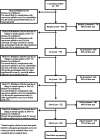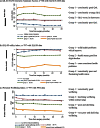Pre-Surgery Depression and Confidence to Manage Problems Predict Recovery Trajectories of Health and Wellbeing in the First Two Years following Colorectal Cancer: Results from the CREW Cohort Study
- PMID: 27171174
- PMCID: PMC4865190
- DOI: 10.1371/journal.pone.0155434
Pre-Surgery Depression and Confidence to Manage Problems Predict Recovery Trajectories of Health and Wellbeing in the First Two Years following Colorectal Cancer: Results from the CREW Cohort Study
Abstract
Purpose: This paper identifies predictors of recovery trajectories of quality of life (QoL), health status and personal wellbeing in the two years following colorectal cancer surgery.
Methods: 872 adults receiving curative intent surgery during November 2010 to March 2012. Questionnaires at baseline, 3, 9, 15, 24 months post-surgery assessed QoL, health status, wellbeing, confidence to manage illness-related problems (self-efficacy), social support, co-morbidities, socio-demographic, clinical and treatment characteristics. Group-based trajectory analyses identified distinct trajectories and predictors for QoL, health status and wellbeing.
Results: Four recovery trajectories were identified for each outcome. Groups 1 and 2 fared consistently well (scores above/within normal range); 70.5% of participants for QoL, 33.3% health status, 77.6% wellbeing. Group 3 had some problems (24.2% QoL, 59.3% health, 18.2% wellbeing); Group 4 fared consistently poorly (5.3% QoL, 7.4% health, 4.2% wellbeing). Higher pre-surgery depression and lower self-efficacy were significantly associated with poorer trajectories for all three outcomes after adjusting for other important predictors including disease characteristics, stoma, anxiety and social support.
Conclusions: Psychosocial factors including self-efficacy and depression before surgery predict recovery trajectories in QoL, health status and wellbeing following colorectal cancer treatment independent of treatment or disease characteristics. This has significant implications for colorectal cancer management as appropriate support may be improved by early intervention resulting in more positive recovery experiences.
Conflict of interest statement
Figures


References
Publication types
MeSH terms
LinkOut - more resources
Full Text Sources
Other Literature Sources
Medical

